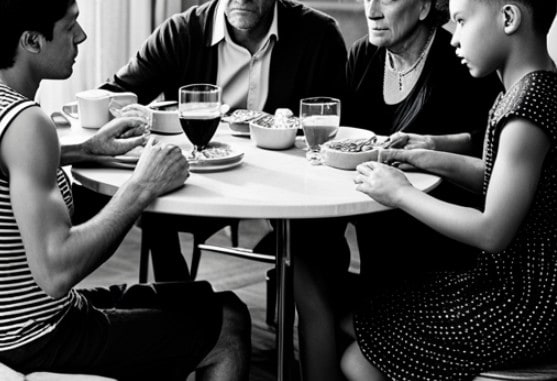Positive parenting is an approach that emphasizes building strong relationships between parents and children, promoting positive behaviors, and reducing negative behaviors. One popular approach to positive parenting is the “5 R’s” model, which provides parents with a framework for responding to their children’s behaviors in a positive and effective way. The 5 R’s stand for “reinforce, remind, redirect, reason, and respect.”
Reinforcement involves praising and rewarding positive behaviors, such as good manners or sharing. Reminding involves gently reminding children of the rules and expectations, such as reminding them to use their inside voice or to finish their homework. Redirecting involves guiding children towards more appropriate behaviors, such as suggesting a different activity or offering a compromise. Reasoning involves explaining the reasons behind the rules and expectations, such as explaining why it’s important to be kind to others. Finally, respect involves treating children with respect and empathy, even when they make mistakes or misbehave.
What is Positive Parenting?
Positive parenting is an approach to raising children that focuses on building strong relationships between parents and children while also promoting their emotional and social development. Positive parenting is based on the belief that children who are treated with respect and kindness are more likely to be happy, healthy, and successful.
Definition of Positive Parenting
Positive parenting involves using positive reinforcement to encourage good behavior and discourage negative behavior. This means praising children when they behave well and ignoring or redirecting them when they misbehave. Positive parenting also involves setting clear rules and boundaries for children and consistently enforcing them.
One of the key principles of positive parenting is that parents should focus on the positive aspects of their children’s behavior rather than the negative. This means looking for opportunities to praise and reward children for good behavior rather than constantly criticizing or punishing them for bad behavior.
Positive parenting also involves promoting children’s emotional and social development by teaching them important life skills such as problem-solving, decision-making, and empathy. This can be done through activities such as role-playing, storytelling, and other interactive games and exercises.
Overall, positive parenting is an approach to raising children that emphasizes love, respect, and kindness while also promoting their emotional and social development. It is a powerful tool for helping children grow into happy, healthy, and successful adults.
The 5 R’s in Positive Parenting Solutions
Positive Parenting Solutions is a parenting philosophy that emphasizes building strong relationships with children, promoting positive behaviors, and reducing negative behaviors. One of the key components of Positive Parenting Solutions is the 5 R’s, which are Repeat Back, Related, Reasonable, Respectful, and Problem-Solving.
Repeat Back
Repeat Back is the first R in Positive Parenting Solutions. This technique involves repeating what your child has said to you to ensure that you have understood their message correctly. This helps to prevent misunderstandings and shows your child that you are actively listening to them.
Related
Related is the second R in Positive Parenting Solutions. This technique involves acknowledging your child’s feelings and showing empathy towards them. This helps your child feel heard and understood, which can reduce negative behaviors and promote positive behaviors.
Reasonable
Reasonable is the third R in Positive Parenting Solutions. This technique involves setting reasonable expectations and consequences for your child’s behavior. This helps your child understand what is expected of them and what will happen if they do not meet those expectations.
Respectful
Respectful is the fourth R in Positive Parenting Solutions. This technique involves treating your child with respect and dignity, even when you are disciplining them. This helps to build a strong relationship between you and your child and promotes positive behaviors.
Problem-Solving
Problem-Solving is the fifth R in Positive Parenting Solutions. This technique involves working with your child to find solutions to problems that arise. This helps your child develop problem-solving skills and promotes positive behaviors.
In conclusion, the 5 R’s in Positive Parenting Solutions are Repeat Back, Related, Reasonable, Respectful, and Problem-Solving. These techniques can help parents build strong relationships with their children, promote positive behaviors, and reduce negative behaviors. By using these techniques, parents can create a positive and supportive environment for their children to grow and thrive in.
The Importance of Positive Parenting Techniques
Positive parenting techniques are essential in raising responsible and well-adjusted children. These techniques include teaching, being consistent, logical, and fair. By implementing these techniques, parents can provide a nurturing environment that fosters healthy development and positive behavior in their children.
Teaching
One of the essential positive parenting techniques is teaching. Parents should take the time to teach their children the skills they need to succeed in life. This includes teaching them how to communicate effectively, how to solve problems, and how to make good decisions. By doing so, parents can help their children develop self-confidence and independence.
Consistent
Consistency is another crucial positive parenting technique. Parents should establish clear rules and expectations for their children and consistently enforce them. This helps children understand what is expected of them and helps them feel secure and safe. When parents are inconsistent, children may become confused and anxious, which can lead to negative behavior.
Logical
Parents should also use logical consequences when disciplining their children. Logical consequences are those that are directly related to the misbehavior. For example, if a child breaks a toy, they should be responsible for repairing or replacing it. This helps children understand the consequences of their actions and learn responsibility.
Fair
Finally, parents should be fair when disciplining their children. Punishments should fit the crime, and parents should avoid being overly harsh or punitive. Fair discipline helps children understand that their parents are on their side and that they are being treated with respect.
In conclusion, positive parenting techniques are crucial in raising responsible and well-adjusted children. By teaching, being consistent, logical, and fair, parents can provide a nurturing environment that fosters healthy development and positive behavior in their children.
Discipline Strategies in Positive Parenting
Positive parenting is an approach that emphasizes building a strong relationship with your child while promoting good behavior. Discipline is an essential component of positive parenting, but it is different from punishment. Discipline focuses on teaching your child how to behave appropriately rather than simply punishing them for misbehavior.
Natural Consequences
One of the most effective discipline strategies in positive parenting is natural consequences. This approach involves allowing your child to experience the natural consequences of their actions. For example, if your child refuses to wear a coat on a cold day, they will feel cold, and they will learn that wearing a coat is necessary to stay warm.
Natural consequences are a powerful teaching tool because they help children understand the consequences of their actions. However, it is important to use this approach carefully. Natural consequences should be age-appropriate, and they should not put your child in danger.
Time-Out
Another popular discipline strategy in positive parenting is time-out. Time-out involves removing your child from a situation when they misbehave and placing them in a quiet, safe space for a short period. This approach allows your child to calm down and reflect on their behavior.
Time-out can be an effective way to teach your child self-regulation and self-control. However, it is important to use this strategy correctly. Time-out should be used sparingly and should not be used as a punishment. It should be a time for your child to calm down and reflect on their behavior, not a time for them to feel isolated or punished.
In conclusion, discipline strategies are an essential component of positive parenting. Natural consequences and time-out are two effective strategies that can help teach your child appropriate behavior while building a strong relationship with them. By using these strategies with care and consistency, parents can help their children develop the skills they need to succeed in life.
Avoiding Power Struggles in Positive Parenting
Positive parenting is all about creating a respectful and loving relationship between parents and children. However, power struggles can often arise, leading to tension and frustration between parents and children. To avoid such conflicts, parents can follow the 5 R’s of positive parenting solutions: respect, relationship, reframe, respond, and repair.
Leading
Leading is an essential component of positive parenting. Parents need to lead by example and set clear expectations for their children. By doing so, they can help their children develop self-discipline, responsibility, and cooperation. When parents lead with respect, they can avoid power struggles and build a positive relationship with their children.
Communicating
Communication is key in positive parenting. Parents need to communicate with their children in a way that is respectful and empathetic. They should listen to their children’s concerns and feelings and respond in a way that shows they understand. By doing so, parents can build a strong relationship with their children and avoid power struggles.
Thoughtful Limits
Setting thoughtful limits is another critical aspect of positive parenting. Parents need to set boundaries and rules that are age-appropriate and reasonable. When parents set thoughtful limits, they can help their children develop self-control and learn to make good choices. By doing so, they can avoid power struggles and build a positive relationship with their children.
In conclusion, avoiding power struggles is crucial in positive parenting. By leading with respect, communicating effectively, and setting thoughtful limits, parents can build a strong relationship with their children and help them develop important life skills.
Building Strong Relationships through Positive Parenting
Positive parenting is a powerful way to build strong relationships between parents and children. By using positive parenting solutions, parents can create a nurturing and supportive environment that promotes healthy development and positive behavior. The 5 R’s of positive parenting solutions are an effective way to create a positive parenting environment that fosters strong relationships between parents and children.
Caring
Caring is an essential component of positive parenting. Parents who show care and empathy towards their children create an environment that fosters love and trust. By showing care, parents can help their children feel valued and supported, which can lead to positive behavior and healthy development.
Responsive
Being responsive to a child’s needs is another essential component of positive parenting. When parents respond to their child’s needs promptly and appropriately, they help their child feel heard and understood. This can lead to greater self-esteem and confidence, which can help children develop positive behaviors and healthy relationships.
Repeat Back
Repeat back is a technique that can help parents show empathy and understanding towards their children. When parents repeat back what their child has said, they show that they are listening and that they care about what their child is saying. This can help children feel valued and supported, which can lead to greater trust and stronger relationships.
One-on-One Time
One-on-one time is an important component of positive parenting. Spending quality time with children can help parents build strong relationships and create positive memories. Whether it’s reading a book, playing a game, or simply talking, one-on-one time can help parents connect with their children and foster healthy relationships.
In summary, positive parenting solutions are an effective way to build strong relationships between parents and children. By using the 5 R’s of positive parenting solutions, parents can create a nurturing and supportive environment that promotes healthy development and positive behavior. By being caring, responsive, using repeat back, and spending one-on-one time with their children, parents can create a positive parenting environment that fosters strong relationships and healthy development.
Conclusion
Positive parenting solutions are a set of tools and strategies that can help parents raise happy, healthy, and well-adjusted children. The 5 R’s of positive parenting solutions are a simple and effective way to remember the key elements of positive parenting. By using these strategies, parents can create an environment that is supportive, nurturing, and empowering for their children.
The first R, “Relationship,” emphasizes the importance of building a strong and positive relationship with your child. This involves taking the time to listen to your child, showing empathy and understanding, and being available and responsive to their needs.
The second R, “Respect,” focuses on treating your child with respect and dignity. This involves setting clear boundaries and expectations, and using positive discipline techniques that promote learning and growth.
The third R, “Responsibility,” emphasizes the importance of teaching your child to take responsibility for their actions and their impact on others. This involves setting age-appropriate expectations and giving your child opportunities to make choices and learn from their mistakes.
The fourth R, “Reassurance,” involves providing your child with emotional support and reassurance. This involves acknowledging your child’s feelings, providing comfort and validation, and helping your child develop coping skills to deal with stress and adversity.
Finally, the fifth R, “Recognition,” involves recognizing and celebrating your child’s strengths and accomplishments. This involves providing positive feedback and encouragement, and helping your child develop a sense of self-worth and confidence.
Overall, the 5 R’s of positive parenting solutions provide a framework for creating a supportive and nurturing environment for your child. By using these strategies consistently, parents can help their children develop the skills and resilience they need to thrive in life.




